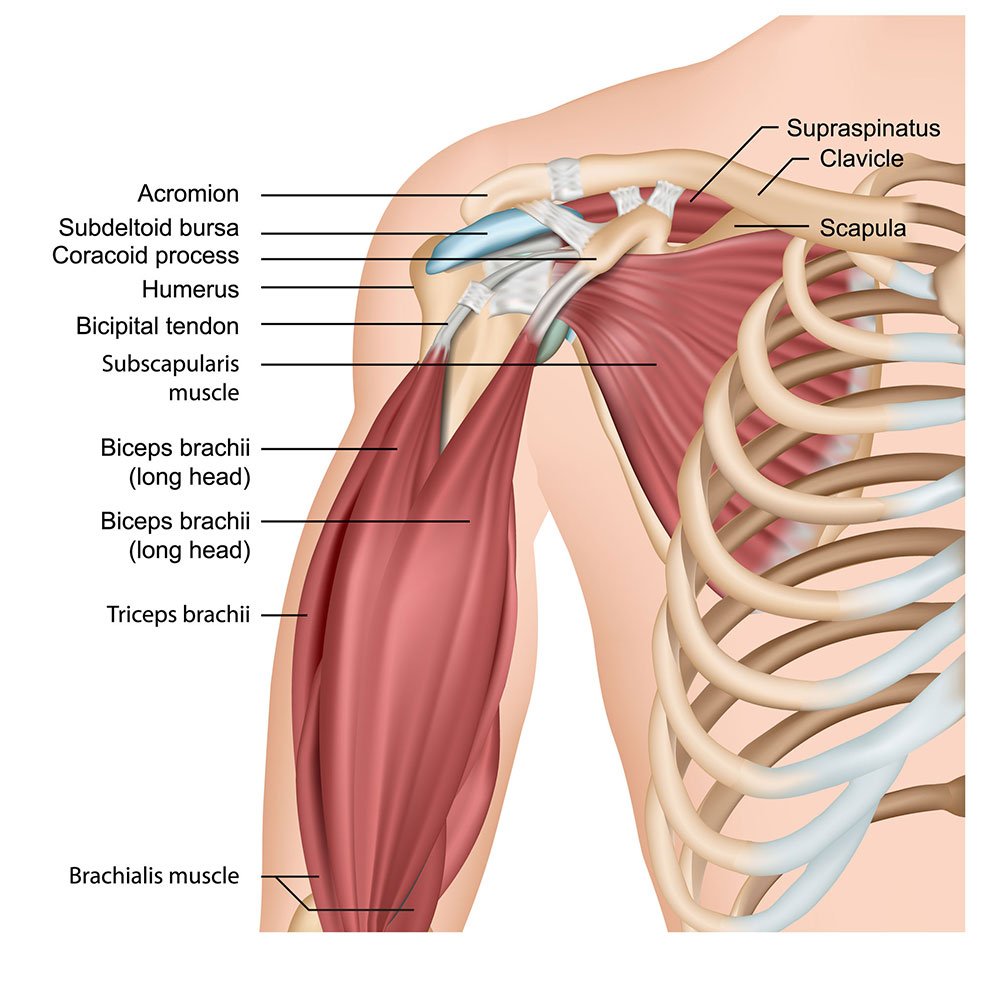Biceps Tendonitis: Symptoms, Causes & Treatments
Biceps tendonitis happens when the tendon becomes irritated and inflamed, causing pain and limiting strength. Though any tendon can develop tendonitis, certain tendons are more vulnerable than others.
Tendonitis vs Tendinitis vs Tendinosis
First and foremost, it’s important to understand the difference between tendonitis, tendinitis and tendinosis.
Tendonitis and tendinitis are two different spellings of the same acute condition. Tendinosis, on the other hand, is a chronic condition caused by repetitive injury, trauma and/or untreated tendonitis.
What is biceps tendonitis?
The biceps muscle stretches from the radius bone at the elbow to the shoulder and connects to the shoulder joint via two tendons, called the long head and the short head. The long head of the biceps tendon (LHBT) runs up the length of the upper arm and attaches to the labrum and shoulder blade top of the shoulder joint. The short head of the biceps tendon attaches adjacent to the socket at the coracoid process (hook-like structure) on the front of the scapula.
Biceps tendonitis is most commonly inflammation of the biceps’ long head tendon at the shoulder joint. Approximately 5% of people with biceps tendonitis have what is called primary biceps tendonitis, which is inflammation of the LHBT where it lays within a deep groove in the humerus (upper arm bone). This is called proximal biceps tendonitis. The other 95% of people with this condition usually also have a rotator cuff tear or a SLAP (superior labrum anterior to posterior) lesion.
This condition can also occur at the LHBT’s insertion at the elbow (called distal biceps tendonitis), though this is less common and it is rare to experience biceps tendonitis at both the shoulder and the elbow at the same time.
Common Symptoms
- Sharp pain in the front of the shoulder (especially when reaching overhead, across the body or behind the back)
- Pain that radiates down the front of the arm or from the shoulder to the neck
- Weakness around the shoulder joint
- A clicking, snapping or catching sound or feeling in the front of the shoulder with movement
- Achy, dull pain or tenderness at the front of the shoulder
- Pain when throwing a ball
- Pain that becomes worse at night
Causes
Unfortunately, biceps tendonitis can result from everyday activities, as wear and tear slowly irritate and weaken the tendon. Other common causes include:
- Repetitive overhead movement
- Weak upper back muscles
- Rotator cuff tears
- Shoulder joint hypermobility
- Shoulder joint and/or muscle tightness
- New and/or increased workout routine
- Weightlifting (particularly distal biceps tendonitis from biceps curls)
Treatment Options
In addition to RICE (rest, ice, compression, elevation) and NSAIDs (nonsteroidal anti-inflammatory drugs), your orthopedic specialist will most likely prescribe physical therapy to rehabilitate your biceps tendon(s). Physical therapy for biceps tendonitis usually includes range-of-motion exercises, manual therapy, functional training and pain management.

If these conservative approaches do not adequately rehabilitate the biceps tendon, steroid injections may be recommended. If you have additional shoulder injuries or issues, biceps tendon surgery may be a good option.
Biceps Tenodesis
In this arthroscopic surgical procedure, the damaged section of the biceps tendon is removed and the remaining tendon is reattached to the humerus to relieve symptoms and restore function.
Tenotomy
If the long head of the biceps tendon is too damaged to repair via biceps tenodesis, your orthopedic surgeon may choose to release the damaged biceps tendon from the scapula. This option, while the least invasive and very effective for reestablishing strength, may result in a “Popeye bulge” in the arm.
How long does biceps tendonitis take to heal?
Biceps tendonitis can take anywhere between six weeks and six months to heal properly, with or without surgery. The exact biceps tendonitis recovery time varies from person to person, injury to injury.
If you’re experiencing pain in your biceps, shoulders or elbows and would like to talk to one of our orthopedic specialists, please contact us today or comment below.

6 Comments
Permalink
Hello,
I am a powerlifter. About 2 weekends ago I had benched on a Saturday and woke up on a Sunday to my chest and shoulders sore which is normal but my right shoulder was just alittle but more sore, at the time didn’t think much of it. But then by that Monday I had my primary bench day which went fine still had soreness but nothing crazy. Then I started doing flys and noticed my right shoulder is making a clicking sound. That’s when I got concerned because it had never done that. So I have been on the internet ever since giving my self tests and came to figure out it is my long head bicep tendon. Ever since that Monday I have had little or no pain at all just alittle bit of tightness in shoulder and bicep and the clicking in front of shoulder which is what’s scaring me. I don’t have any bruising or anything in that matter. I have all range of motion. Just when I go to do pec flys or overhead work I will get that clicking or dull pain if any. Came across this site and wanted see what I should do. Do I keep bench pressing light or what?
Permalink
Hi Cameron, in most cases, a painless popping or clicking sensation in the shoulder is not a serious issue. However, if you experience any pain or discomfort, it may warrant further investigation.
Permalink
Good morning,
About 9 months ago i was diagnosed with a radial head fracture on my right elbow from falling with an electric scooter. Nothing major,so i’ve been told to just rest and it’ll be ok. 9 months in , i’ve managed to gain the mobility back (around 95%) , but i do have other issues that started since the fracture and no one seems to listen, all i’m beeing told is “it will pass”, while my right side feels like degrading.
For 3 months i was not able to contract my biceps/triceps , not even a tiny bit. After that i started having pain shooting up to my shoulder, front side where it meets the chest muscle. The pain seemed to pass, but i’m left with a constant discomfort in that area. Plus recently i started having what it seems to be a rotatory cuff injury, shoulder leans forward, the lat and pectoral are also affected, the trapezius muscle on the same side doesn’t engage when exercising, and the whole area feels stiff and painfull when trying to retract the shoulderblade, or do any shoulder movement other than front raises….
I might not have the knowledge of a doctor, but i feel like there was more than just the radial head fracture, also tendons were affected from the beggining. And while my GP and the other doctors i’ve seen tell me to relax it will get better, my issues are not getting better, quite the opposite…
went from a sporty well built lad to a skinny depressed man with a bad posture.
So here i am….any advice would be much apreciated.
I’m looking forward to your reply, Thank you !!!
Permalink
See a good physical therapist who can manually test each specific muscle of the shoulder complex and prescribe appropriate strengthening exercises you can do at home or gym.
Permalink
I have had biceps tendinitis in the shoulder for about 1 year. Should I exercise again to improve this?(GYM)
Permalink
Hi Ruslan, specific exercises can help manage and improve biceps tendinitis by strengthening the muscles and improving flexibility. However, it’s important to follow a program designed by a healthcare professional to avoid further injury. I would suggest scheduling an appointment with an orthopedic specialist to find an appropriate treatment plan for your condition